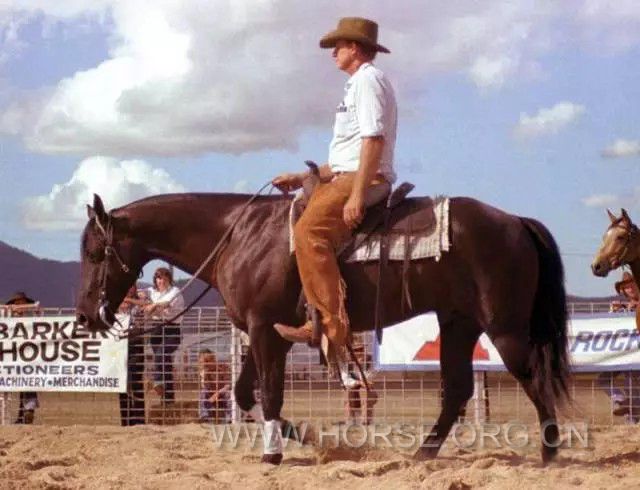马上注册,结交更多马友,享用更多功能
您需要 登录 才可以下载或查看,没有账号?立即注册
x

“安德森,怎样才能让我的骟马的情绪变得稳定,当我给他指令的时候他常常表现出烦躁。每当他配合我的时候我会奖励他,但这并不能使他有好的改变,我害怕继续这样下去他会变得更暴躁,甚至不喜欢我。”
——来自安德森的一位求助者
"Clinton, I want to improve my gelding's behavior, but he gets so grumpy when I ask him to do something. I reward him when he is cooperative, but it doesn't seem to be making him any better. And I'm afraid 'getting after him' will just make his attitude worse--or even make him dislike me."
对此,安德森又是怎么说怎么做的呢?下面就通过一个安德森的小故事来了解一下。

先说说马主对马不正确的态度,这其实在很多人身上都会出现,包括我自己——人们担心马不信任自己不喜欢自己而一味的讨好马,这是不对的,驯马时应时刻记住自己究竟要干什么,那就是必须把马训练好。
Talk about a bad attitude--this horse owner has one! I see this a lot at my clinics. People get so worried about their relationships with their horses and so wrapped up in the whole natural horsemanship thing they forget the bottom line: You've got to get the job done.
当我15岁在澳大利亚跟随戈登麦金利老师 Gordon McKinlay学习驯马时我深切地体会到了这一点。我刚刚开始学习自然驯马时驯的马脾气就非常不好。在我早期训练时,只要马做了对的事我就会给她胡萝卜,让她休息一段时间作为奖励。
I learned this when I was about 15 or 16 while training horses in Australia for Gordon McKinlay. I was just getting started with natural horsemanship, and was working with a big black mare with a bad attitude. In keeping with my early training, as soon as that mare would do something right, I'd instantly reward her with a pat, a treat, and a little break.

▲图为戈登麦金利
我实际上就是在试图贿赂她讨好她,让她喜欢我、服从我。但问题是,她脾气变得越来越差。
I was basically trying to bribe her into loving me and loving what she was doing. Problem is, she was actually getting worse by the day.
戈登在我训练时看了一眼这匹闹腾的母马,说“克林顿,在这匹马身上你做的非常差。” 戈登老师是从来不会拐弯抹角的说话的。
Gordon took one look at this belligerent mare after I'd been working with her for a while and said, "Clinton, you've done a pretty bad job on this horse." Gordon has never been one to mince words.
我说:“ 戈登,我每周七天训练她,做所有你教我的东西,尽力做到最好,但她总是脾气暴躁。”
I said, "Gordon, I've been working with her seven days a week, doing everything you taught me, trying my best to get her where she needs to be, but she's just got a bad attitude."
“好吧” 他回答道,“你最好加紧你的工作,这匹母马下周就要被送回家了,她的主人如果看到她在这里呆了6周变得脾气更暴躁是不会高兴的。”
"Well," he replied, "you'd better step up to the plate and get the job done because this mare has to go home next week, and the owners aren't going to be happy when they see how bad she is after being here for six weeks."

先“问”再“说”:
Ask, then tell:
想知道接下来这周我做了什么吗?我对待那匹母马的态度就像其他马一样,我每天训练她,让她知道什么是对的什么是错的,也让她不断活动而不总是反抗。做每个动作时我都是先“问”她,如果她没有反应我就“说”(命令)她,我不在乎她是否暴躁不满。当她做对时,我只是让她休息一小会;而当她做错时,我会做一些高难度的东西让她感到不舒服。
So here's what I did: For the entire last week of her training, I treated that mare the way I would any other horse. I made her feet move--now. I asked her, and when she didn't respond, I told her. I didn't worry about her feelings or her emotions or her attitude. When she did something right, I rewarded her by simply letting her rest and leaving her alone. When she did something wrong, I made her feel very uncomfortable.

仅仅三天时间,母马的情绪、我们的配合发生了逆天的转变,还赶上了我们应有的进度。她回家时棒得就像被专人驯了六个周一样,也就是说她最后五六天的进步远远大于她五周的训练。
Within three days, that mare's attitude--and her whole perception of work, and of me--completely changed. In fact, in that last week of working with her, I caught her up to where she should've been by that time, despite our initial setbacks. On the day she went home, she was as good as all the other horses that had been ridden for six weeks. In other words, she made more progress in those last five or six days than she had in the entire five weeks before.
但为什么她前五周没有进步呢?
Why didn't she progress in those first five weeks?
这是因为我一直把她像孩子一样的哄着,想去讨好她。但她并不需要这些,她真正需要的,也是我在最后这一个周给她的是 “如果你不喜欢做这个,那就试试另一个(更难的),当你感觉到难、累,出汗的时候就能懂得我平时让你做的是多么简单了”很快,她就知道我真正要求她做的其实并不难。
Because I'd been babysitting her. I'd been trying to coax her into liking me, and the situation.What she'd needed instead, and what I finally gave her in that last week, was a taste of, "If you don't like this, try this. If you thought what I was asking you to do was difficult and sweaty, how about this?
Very quickly, she came to realize that what I'd been originally asking her to do wasn't so bad after all.

不要试图祈求你的马:
Don't Beg! :
这匹母马教会了我一个目前大多数人还不明白的道理:在自然驯马中,即使我特别希望马喜欢我,享受与我在一起的时间,但只要开始驯马,更重要的工作是让马变乖变好,对马严格一些比哄着惯着成功率要大很多,特别是对比较任性的马。
That mare taught me an important aspect of natural horsemanship that a lot of people don't understand. Although I certainly do want my horses to like me and enjoy the time we spend together, the reality is this: When you're training a horse, you have a job to do, and you've got to get that job done. Being businesslike about it will give you your best chance of succeeding at that job. Especially with tough customers!
马很像人,他们性格各异,有些马天生就特别古怪,可你能改变它的性格脾气吗?答案是可以的,但你永远都做不到让马每时每刻服从你。像对人一样,你永远不会被每个人喜欢,有时你只是不经意地瞟了他一眼就可能招来麻烦;但又有时候即使你对他恶言相对,他们可能只是笑笑说“我知道你不是那个意思,来抱一个。”
Horses are a lot like people, their personalities vary. Some horses, like some people, are just naturally cranky. Can you improve their attitude? Sure you can. But you may never get them to put a smile on their face all the time. With some people, you can just look at them sideways and they get angry and hateful. And yet with others, you can insult their mother and they just smile at you and say, "Oh, you don't really mean that. Come over here and let me give you a hug." Horses are the same.

并不是每个进过监狱的人都会改过自新,同样也不是每匹马的性格都可以被完全改变。
Not every person who goes to jail is going to be rehabilitated, and not every belligerent horse is going to completely change his attitude, no matter what you do.
我所发现很有趣的一点是,马脾气越差,人们往往越惯它们,给它们的工作就会越少,马的脾气就会越差。
What I've discovered, though, is that for the horses with the worst attitudes, the more you baby them, the worse they get. The less you ask them to do and the less pressure you put on them, the worse their attitudes become.
相反,让马做的越多,对马要求越多会让马脾气变好。你可能永远不会把一个暴躁的马调教成你理想的马。但只要坚持认真驯马,把驯马当做第一位而不是总想着在训练中跟马搞好关系,总能得到最好的结果。
Conversely, the harder you work them and the more you ask them to do, the better their attitudes get. You may never turn a fundamentally sourminded horse into the horse of your dreams. But by always focusing first on getting the job done, you're always going to get the best possible results with that particular horse.

来源:马语狗说
|
|